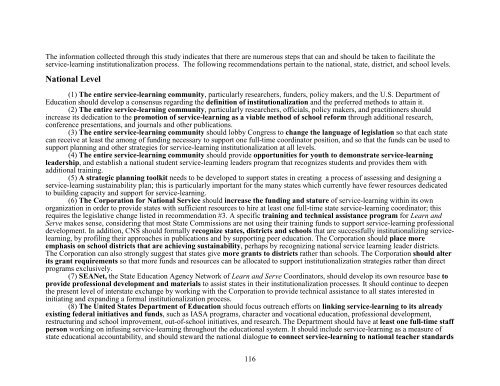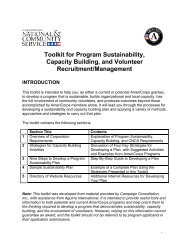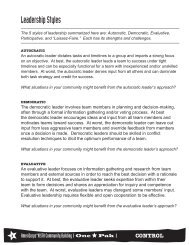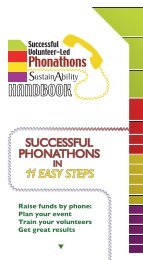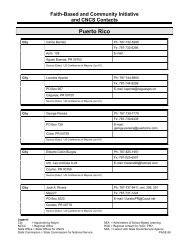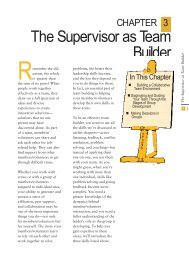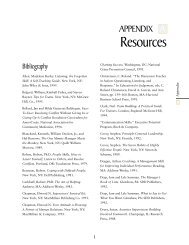MAKE IT LAST FOREVER: THE ... - National Service Resource Center
MAKE IT LAST FOREVER: THE ... - National Service Resource Center
MAKE IT LAST FOREVER: THE ... - National Service Resource Center
Create successful ePaper yourself
Turn your PDF publications into a flip-book with our unique Google optimized e-Paper software.
The information collected through this study indicates that there are numerous steps that can and should be taken to facilitate the<br />
service-learning institutionalization process. The following recommendations pertain to the national, state, district, and school levels.<br />
<strong>National</strong> Level<br />
(1) The entire service-learning community, particularly researchers, funders, policy makers, and the U.S. Department of<br />
Education should develop a consensus regarding the definition of institutionalization and the preferred methods to attain it.<br />
(2) The entire service-learning community, particularly researchers, officials, policy makers, and practitioners should<br />
increase its dedication to the promotion of service-learning as a viable method of school reform through additional research,<br />
conference presentations, and journals and other publications.<br />
(3) The entire service-learning community should lobby Congress to change the language of legislation so that each state<br />
can receive at least the among of funding necessary to support one full-time coordinator position, and so that the funds can be used to<br />
support planning and other strategies for service-learning institutionalization at all levels.<br />
(4) The entire service-learning community should provide opportunities for youth to demonstrate service-learning<br />
leadership, and establish a national student service-learning leaders program that recognizes students and provides them with<br />
additional training.<br />
(5) A strategic planning toolkit needs to be developed to support states in creating a process of assessing and designing a<br />
service-learning sustainability plan; this is particularly important for the many states which currently have fewer resources dedicated<br />
to building capacity and support for service-learning.<br />
(6) The Corporation for <strong>National</strong> <strong>Service</strong> should increase the funding and stature of service-learning within its own<br />
organization in order to provide states with sufficient resources to hire at least one full-time state service-learning coordinator; this<br />
requires the legislative change listed in recommendation #3. A specific training and technical assistance program for Learn and<br />
Serve makes sense, considering that most State Commissions are not using their training funds to support service-learning professional<br />
development. In addition, CNS should formally recognize states, districts and schools that are successfully institutionalizing servicelearning,<br />
by profiling their approaches in publications and by supporting peer education. The Corporation should place more<br />
emphasis on school districts that are achieving sustainability, perhaps by recognizing national service learning leader districts.<br />
The Corporation can also strongly suggest that states give more grants to districts rather than schools. The Corporation should alter<br />
its grant requirements so that more funds and resources can be allocated to support institutionalization strategies rather than direct<br />
programs exclusively.<br />
(7) SEANet, the State Education Agency Network of Learn and Serve Coordinators, should develop its own resource base to<br />
provide professional development and materials to assist states in their institutionalization processes. It should continue to deepen<br />
the present level of interstate exchange by working with the Corporation to provide technical assistance to all states interested in<br />
initiating and expanding a formal institutionalization process.<br />
(8) The United States Department of Education should focus outreach efforts on linking service-learning to its already<br />
existing federal initiatives and funds, such as IASA programs, character and vocational education, professional development,<br />
restructuring and school improvement, out-of-school initiatives, and research. The Department should have at least one full-time staff<br />
person working on infusing service-learning throughout the educational system. It should include service-learning as a measure of<br />
state educational accountability, and should steward the national dialogue to connect service-learning to national teacher standards<br />
116


